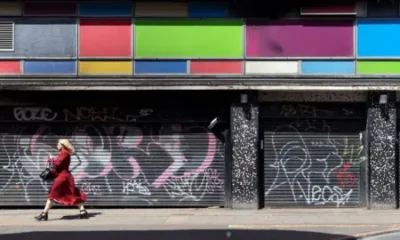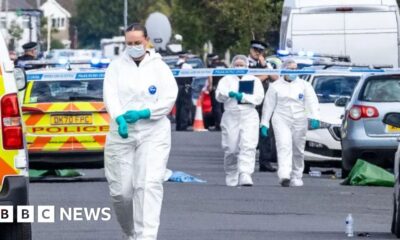Breaking News
Henry Zeffman: Burnham’s provocative challenge to Starmer shows he is serious
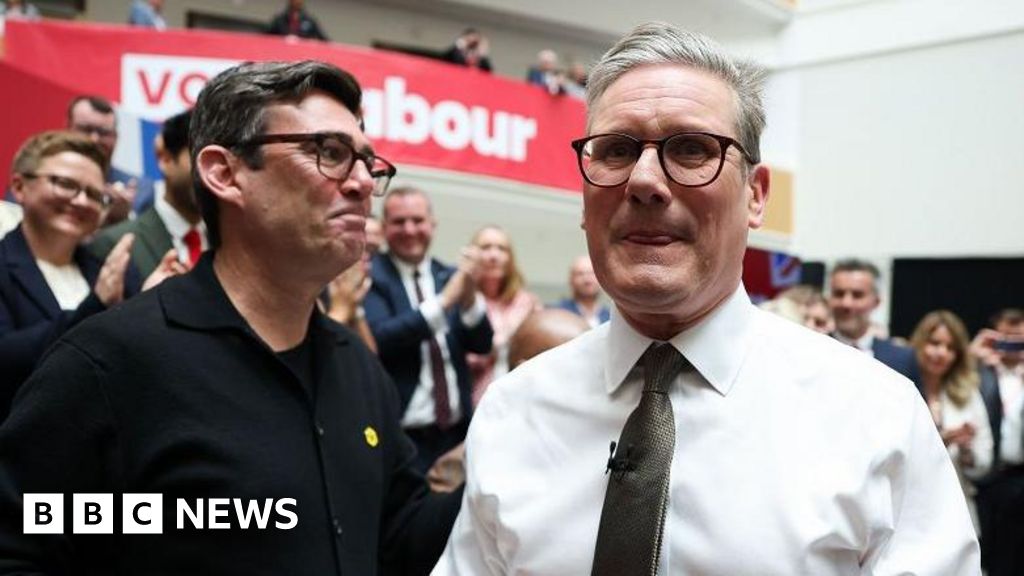
Read more on post.
Location: party conference.
A fairly new prime minister is struggling for popularity with his party and the country at large, against a backdrop of grim economic choices.
A popular, plain-speaking mayor enters the week talked up as a future leader — and is doing little to dampen that speculation himself.
The year is 2012, the prime minister is David Cameron and the mayor is Boris Johnson.
But it could just as well be 2025, Sir Keir Starmer and Andy Burnham.
Sometimes politicians of all parties flirt with the possibility of one day becoming leader in suggestive, coy, almost deniable ways.
This is not an example of that. Burnham is being more overt.
To the Telegraph the Manchester mayor gave a straight answer to a straight question: yes, he had been contacted by Labour MPs “throughout the summer” about the prospect of him returning to Westminster, where he was an MP for 16 years, to lead Labour and replace Starmer as prime minister.
Burnham said this was “more a decision for those people than it is for me”.
Well, up to a point.
Burnham is not an MP. He would have to decide to become one if he wants to be Labour leader and prime minister.
This means that his path to Downing Street is extremely complicated.
First, a Labour MP would need to resign their seat so there is a by-election – unless a contest happened to arise through an MP dying or similar.
Because of Burnham’s distinctive regional pitch, the constituency would surely have to be in Greater Manchester or at least the north-west of England.
Two Manchester Labour MPs, Andrew Gwynne and Graham Stringer, have already ruled out standing down for Burnham.
Then, Burnham would have to be selected as Labour’s candidate.
This would require the approval of Labour’s national executive committee, which for most purposes is controlled by allies of Starmer, although at least some of those would probably support Burnham’s return to Westminster.
Then, he would have to win the by-election in a difficult national political environment for the Labour Party.
And then, finally, Burnham would have to secure the backing of 80 Labour MPs to challenge Starmer – at which point presumably other candidates would enter the fray.
There’s a lot of difficulties along that path.
Still, it is clearly a path that he is willing, at the very least, to publicly entertain.
The mere existence of the Telegraph interview, alongside a long profile in the New Statesman, the bible of left-liberals, is pretty provocative.
Burnham knew that he would be asked questions about his national ambitions, and that they would create a stir in the days before a crucial party conference for Starmer.
Perhaps most notable, though, is that Burnham used both interviews to spell out a policy prospectus: higher council tax on expensive homes, borrowing to invest in council housing, cutting income tax for lower earners and increasing it for higher earners.
In the New Statesman, he said: “We’ve got to get beyond this thing of being in hock to the bond markets”.
That is a direct challenge not just to Starmer but to Chancellor Rachel Reeves and her view – her supporters would say the economic reality – that the government cannot borrow much more money.
It is an argument that quite a few Labour MPs make, mostly in private: that this government has allowed itself to become too constrained by Treasury orthodoxy.
To have Burnham joining that argument publicly, whether his leadership challenge is plausible or not, is unwelcome for Starmer and Reeves.
In government, there is frustration and no small amount of bafflement that Burnham has decided to make these interventions now.
One senior source said he was: “A Boris-sized ego, but without the strategic thought.”
Speaking from the main stage of Conservative conference back in 2012 (an honour not being afforded to Burnham at Labour’s conference next week), Boris Johnson ended up rallying the members behind David Cameron.
It took him seven years to get to No 10.
It’s hard to see the Starmer and Burnham story taking quite so long to play out, whatever the ultimate conclusion.
Breaking News
Taxi driver who dropped off Southport killer regrets ‘driving off in panic’
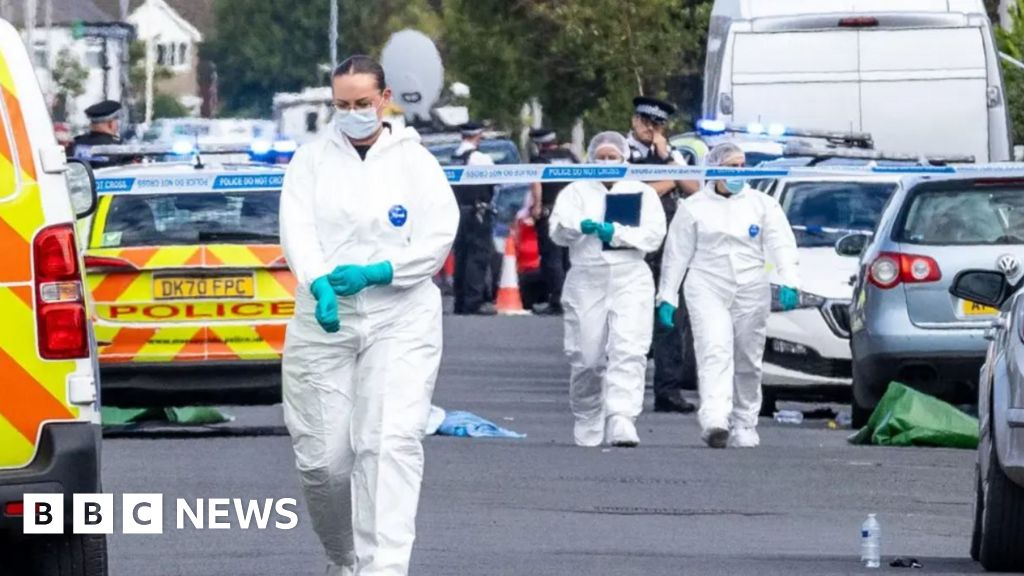
Read more on post.
The taxi driver who dropped off the Southport killer at the dance class where he murdered three children has told a public inquiry he regretted not calling police sooner.
Gary Poland, who did not phone police until 50 minutes after the attack, told the Southport Inquiry he drove away in a panic.
The inquiry at Liverpool Town Hall was told he had believed loud bangs he had heard moments after dropping off Axel Rudakubana were “gunshots”.
Via video-link Mr Poland, who heard screaming and whose vehicle dashcam showed girls running from the venue, said: “I should have called the police earlier. In hindsight I wish I had done and it’s something I think about every day.”
Alice Aguiar, nine, Elsie Dot Stancombe, seven, and Bebe King, six, were killed in the attack, and eight other girls and two adults were also injured.
The inquiry heard that after the attacker refused to pay for the taxi, Mr Poland saw him go into the Hart Space and then heard the loud bangs.
“It was terrifying,” he said.
“You were fearful and in a state of shock. I just thought someone was shooting.”
He said he then went into “panic mode.”
Mr Poland also heard the victims screaming.
He said: “I should have called the police earlier. In hindsight I wish I had done and it’s something I think about every day.
“I did what I did because of fear, shock and panic. These are human emotions which I could not control.”
Nicholas Moss KC, counsel to the inquiry, said in his statement to police Mr Poland described seeing “a massed huddle of children stumble and run in a panicked hurry”.
The statement described the girls “screaming… it was like a stampede for their lives”.
Mr Moss also said dashcam footage from Mr Poland’s taxi shows the girls running alongside his vehicle, and showed him looking in the rear view mirror.
In his statement to the inquiry, Mr Poland said he did not know the children had been injured.
Mr Moss asked Mr Poland if he accepted that he should have stopped on Hart Street as soon as he was out of harm’s way, and called the police.
Mr Poland replied: “Yeah.”
Mr Moss also said a transcript of the phone call he made to his friend had him talking about his belief that the attacker had a gun, but did not show him expressing any concern for the girls.
Mr Moss asked him if it was fair or unfair that the purpose of the call was “guess what just happened to me”.
Mr Poland replied: “Unfair.”
Earlier Mr Poland had said: “I can’t sleep at night. I shut my eyes, I see his [the attacker ‘s] face. He is just there all the time in my head.”
The inquiry continues.
Breaking News
Trump calls for investigation into UN ‘triple sabotage’

Read more on post.
US President Donald Trump has demanded an investigation into what he called “triple sabotage” after an escalator, teleprompter and sound system malfunctioned while he attended the United Nations General Assembly.
The UN said the events that happened while Mr Trump was at its headquarters in New York on Tuesday were accidental and partly blamed the issues on White House staff.
But in a long social media post, the US president described the string of mishaps as “very sinister”, called for people to be arrested and said the Secret Service was also probing the events.
In a post on his Truth Social platform, Mr Trump said: “This wasn’t a coincidence, this was triple sabotage at the UN. They ought to be ashamed of themselves.
“I’m sending a copy of this letter to the secretary general and I demand an immediate investigation.
“No wonder the United Nations hasn’t been able to do the job that they were put in existence to do.”
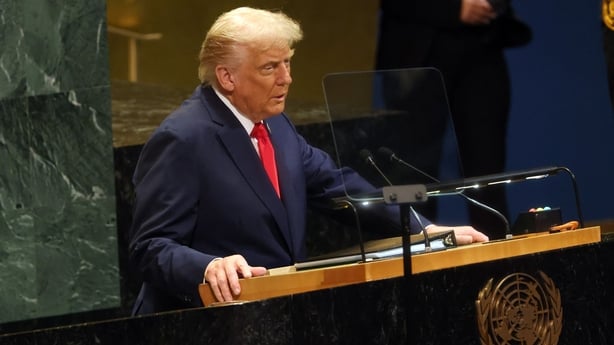
Footage showed the 79-year-old president and First Lady Melania Trump getting on the escalator at UN headquarters on Tuesday before it stopped with a lurch, forcing them to walk up.
Then, as he began his speech, he noted his teleprompter was not working.
He spent much of the rest of the speech criticising the world body, accusing it of funding illegal migration that was turning Western countries into “hell” and failing to support his peace efforts in Gaza and Ukraine.
But while Mr Trump struck a mostly jovial tone about the escalator, his mood hardened a day later.
“A REAL DISGRACE took place at the United Nations yesterday. Not one, not two, but three very sinister events!” he wrote.
Mr Trump said the escalator stop could have been a “real disaster”.
“It’s amazing that Melania and I didn’t fall forward onto the sharp edges of these steel steps, face first,” he added.
The president then complained that his teleprompter for his speech was “stone cold dark” for the first 15 minutes and that the sound in the UN auditorium was “completely off”.
The US president called for the security tapes for the escalator to be saved, adding: “The Secret Service is involved.”
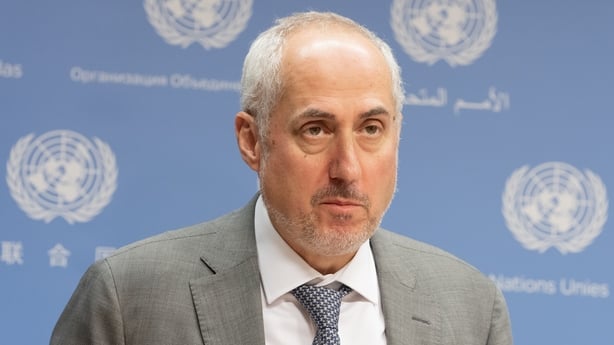
UN spokesperson Stéphane Dujarric on Tuesday issued a statement addressing the matter, saying a videographer from the US delegation “may have inadvertently triggered the safety function” on the escalator.
“Regarding the teleprompter, we have no comment since the teleprompter for the US president is operated by the White House,” he said.
A Secret Service official, speaking on condition of anonymity, told AFP the agency was “looking into what the UN said to corroborate it”.
Reached for comment after Mr Trump’s post yesterday, a UN official, also speaking on condition of anonymity, pointed to Mr Dujarric’s earlier statement.
Regarding the alleged sound issues, the official said: “The sound system was designed to allow people at their seats to hear speeches being translated into six different languages through earpieces.”
Mike Waltz, the newly installed US ambassador, said on X that he had formally demanded the “complete results” of the UN’s probe of the escalator incident, as well as a “detailed explanation of the teleprompter failure’s root cause, along with immediate plans to implement robust preventive measures”.
“The United States will not tolerate threats to our security or dignity at international forums,” Mr Waltz said.
“We expect swift cooperation and decisive action,” he added.
Breaking News
Response to scabies at nursing home ‘lacked coordination’

This post was originally published on this site.
A poorly coordinated response to an outbreak of scabies at a Kilkenny nursing home led to non-compliance in infection control, according to an inspection report by the Health Information and Quality Authority (HIQA).
The report says that a significant number of residents and staff had shown signs of a contagious skin infestation since September 2024, almost ten months prior to the inspection.
A clinical diagnosis of scabies was made by a GP, and a dermatologist confirmed crusted scabies, which is a severe and more contagious progression of infestation.
The public health team was notified and an outbreak of scabies was declared at the end of May this year.
The report says the response to the outbreak was “fragmented and lacked coordination and oversight”, which “likely contributed to the persistence of the issue”.
A review of documentation by HIQA indicated that residents showing signs of infestation were not immediately isolated pending clinical diagnosis and for 24 hours after initial treatment.
This, according to the watchdog, may have allowed the infestation to spread between residents, staff and possible visitors.
Two residents had completed their initial course of treatment on the morning of the inspection. However, staff were unclear regarding the required duration of isolation following the initial course of treatment.
The report points out that clothing and bedding were mismanaged after residents received treatment for confirmed or suspected scabies, with unnecessary delays prior to sending for laundering.
Additionally, items that could not be laundered, such as slippers, shoes and soft toys, were not appropriately managed when residents were treated, according to the report.
Bedrooms were also not routinely deep cleaned when residents were treated for the condition.
The provider was required to take urgent action following this inspection to ensure there was local oversight, supervision and assurance mechanisms in place to ensure that the outbreak was effectively managed.
The inspection report is one of 50 published today.
Evidence of good practice and compliance with regulations and standards were found in a number of inspections.
However, 19 centres were non-compliant with three regulations or less, and seven centres non-compliant with four or more regulations.
In a South County Dublin nursing home, the registered provider failed to take all reasonable measures to protect residents from all forms of abuse.
Some had a history of responsive behaviours, which were a known safeguarding risk to other residents and had measures documented to mitigate risk.
However, the measures had not always been effective and had failed to protect residents from abuse, according to the report.
When inspectors visited the home in June, multiple residents, visitors and staff reported that the temperature in the centre, including some bedrooms and communal areas, was excessively warm.
This was a significant issue during the inspection, according to HIQA.
The inspectors were informed that the central heating could not be switched off, nor could the settings be adjusted to account for the outdoor temperature.
A number of instances where residents were not adequately supervised were also observed.
A resident who had been assessed as being at high risk of falls was seen standing on a chair with no staff present.
Three residents in the sitting room were also seen sitting for 20 minutes without staff supervision and without access to a call-bell for assistance if required.
-
Culture2 days ago
Taylor Swift’s new cinema outing generates more than €12million in just 24 hours
-
Politics2 days ago
European Parliament snubs Orbán with vote to shield Italian MEP from Hungarian arrest
-
Culture2 days ago
Milan Fashion Week 2025: Unmissable shows and Giorgio Armani in mind
-
Health3 days ago
EU renews support for WHO’s Universal Health Coverage Partnership
-
Opinion2 days ago
AI Is Pointless If It Doesn’t Boost Productivity
-
Environment1 week ago
Chimps drinking a lager a day in ripe fruit, study finds
-
Environment2 days ago
Nasa plans first crewed Moon mission in 50 years for February 2026
-
Culture2 days ago
From Koniaków to Paris: how traditional Polish crocheting is captivating high fashion






